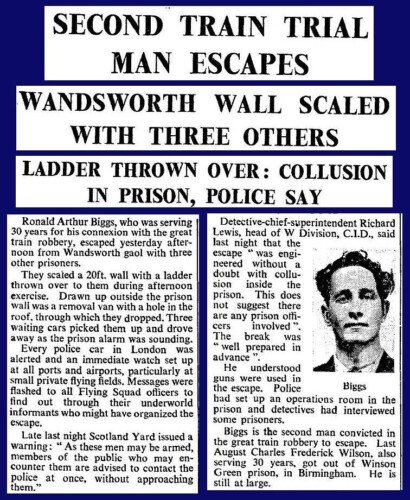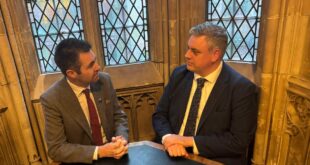On March 24, 1981, the most well-known member of a gang that made off with £2.6million from a mail train, was rescued by Barbados police following his kidnapping.
Stockwell-born Ronnie Biggs was saved from his captors by Barbados coppers whilst on the run from the UK police.
The 52-year-old was found on a yacht which had broken down seven miles from the coast of Barbados.
Reports at the time suggested that Biggs was taken from a bar in Rio de Janeiro on March 18, where he was due to meet some new friends.
But when the men turned up, Biggs was bundled into a waiting car and taken by plane to the coast where they boarded a yacht bound for Barbados.
The cocky cockney villain had been on the run since 1965, when he escaped from Wandsworth Prison by scaling a wall with a rope ladder and dropping into a waiting removal van.
The escape came 15 months into a 30 year sentence for his involvement in the Great Train Robbery of 1963.
Throughout his early life, Biggs had spent a number of stints in prison for theft including a short sentence at HMP Wandsworth for a failed robbery attempt of a bookmaker’s office in Lambeth.
But, the foiled plot opened new doors for Biggs when he met Bruce Reynolds during his incarceration and learned of the plan to steal two-and-a-half-tons of cash from a Royal Mail Train.
After his release, Biggs needed money. On August 8, 1963, Biggs and 14 other men stopped the Glasgow–London Royal Mail Train near Bridego Bridge, north of London, and stole £2.6million. Biggs was awarded about £148,000 of the takings.

The armed robbery—which became known as the “heist of the century”—precipitated a massive manhunt, and Biggs was among the 12 robbers caught. In 1964 he was found guilty and sentenced to 30 years.
After his escape he underwent £40,000-worth of plastic surgery to change his appearance in Paris, before he moved to Melbourne, Australia. Within five years the authorities were catching up to him and he fled to Brazil in 1969.
Bigs became a popular figure and would invite paying guests to hear his stories as a way to make money after the robbery stash ran out.
The men who carried out the kidnapping in 1981, were former British soldiers and members of a security firm headed by Patrick King and John Miller.
They had planned to get Biggs extradited to serve the rest of his sentence in the UK.
Speaking about the kidnapping at the time, Mr Miller said: “It wasn’t that we wanted to bring him back personally, it was just a job. If we hadn’t done it someone else certainly would have.”
But, Barbados had no extradition treaty with Britain, and Biggs was allowed to fly back to Brazil.

Former Detective Superintendent Jack Slipper, the man who led the initial hunt for Mr Biggs told the BBC: “I would have liked him to come back under his own steam or under some other legal method.”
After 35 years on the run Biggs returned to the UK voluntarily in 2001.
In an email sent to the Sun newspaper, Biggs explained: “I am a sick man. My last wish is to walk into a Margate pub as an Englishman and buy a pint of bitter. I hope I live long enough to do that.”
On his return he was taken to the medical wing of Belmarsh Prison to continue serving his initial 30 year sentence, but was freed in 2009 on health grounds.
Biggs died in December 2013, on the same day the BBC was due to broadcast the first part of a two-part TV dramatisation of the robbery.
Pictured top: Ronnie Biggs was sentenced to 30 years in Wandsworth Prison for his part in the Great Train Robbery in 1963 (Picture:World History Archive / Alamy Stock Photo)


